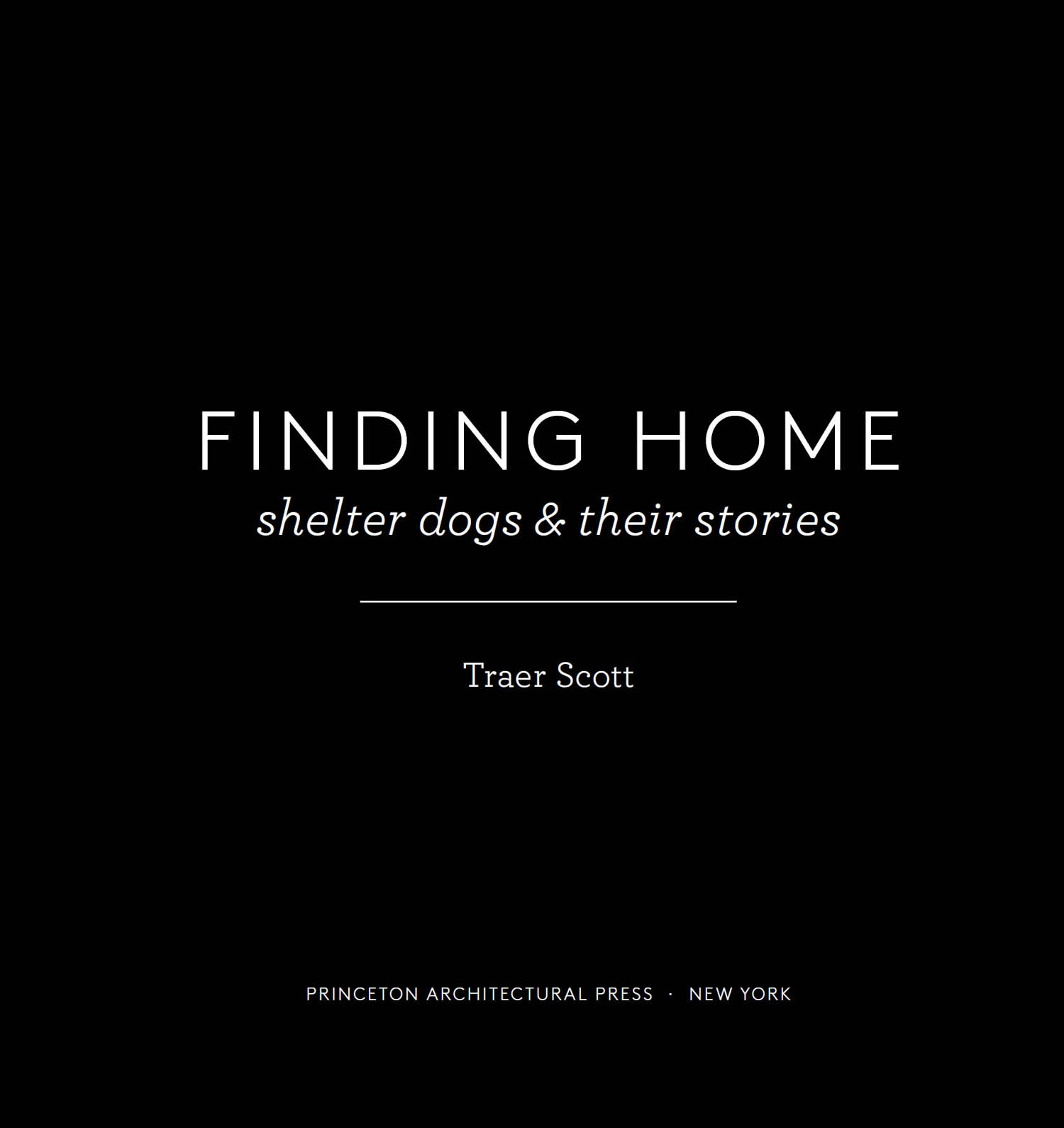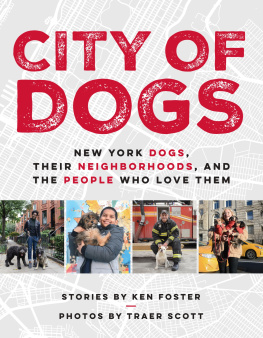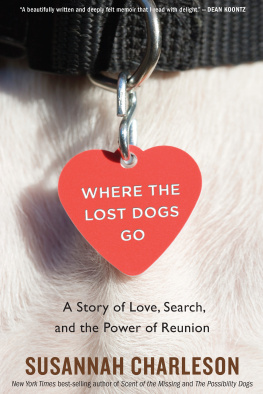


For my Cricket.
I look for you in every dog I meet.

Published by
Princeton Architectural Press
37 East Seventh Street
New York, New York 10003
Visit our website at www.papress.com.
2015 Traer Scott
All rights reserved
No part of this book may be used or reproduced in any manner without written permission from the publisher, except in the context of reviews.
Every reasonable attempt has been made to identify owners of copyright. Errors or omissions will be corrected in subsequent editions.
Editor: Sara E. Stemen
Designer: Mia Johnson
Special thanks to: Nicola Bednarek Brower, Janet Behning, Erin Cain, Megan Carey, Carina Cha, Andrea Chlad, Tom Cho, Barbara Darko, Benjamin English, Jan Cigliano Hartman, Jan Haux, Lia Hunt, Diane Levinson, Jennifer Lippert, Jaime Nelson, Rob Shaeffer, Marielle Suba, Kaymar Thomas, Paul Wagner, Joseph Weston, and Janet Wong of Princeton Architectural Press
Kevin C. Lippert, publisher
Library of Congress Cataloging-in-Publication Data
Scott, Traer.
Finding home: Shelter dogs and their stories / Traer Scott.
pages cm
ISBN 978-1-61689-343-9 (alk. paper)
ISBN 978-1-61689-471-9 (epub, mobi)
1. DogsAnecdotes. 2. DogsPictorial works.
3. Dog adoptionAnecdotes. I. Title.
SF426.2.S42 2015
636.7dc23
2014045183
INTRODUCTION

My 2006 book Shelter Dogs started off as a fragile thing, a project as pure and intuitive as its subjects. My editor and I truly didnt know if the world was ready to look all of those faces in the eye, but a nation of dog lovers soon responded with a resounding yes. It received rave reviews and sold over fifty-thousand copies worldwidefar beyond expectations. The book raised tens of thousands of dollars for the American Society for the Prevention of Cruelty to Animals (ASPCA) and was even translated into Japanese.
The success of Shelter Dogs launched my career. So much has changed in my life since then. I traveled the world with a camera for several years; digital replaced film; I published five books; my darkroom became a nursery; I became a mom; my best friend of sixteen years died. But there are many more things that have not changed: I am still married to the man I love; I still live in the same terribly unfinished historic house; I still wish my hair were straighter; and I still marvel at how fortunate I am to do what I love every single day.
Unfortunately, for millions of dogs, nothing has changed.
In the past decade I have seen the desire to adopt, as well as knowledge about both the plight of homeless animals and the need to spay and neuter, increase dramatically, but still not enough. According to the ASPCA, over one million dogs are euthanized every year in US shelters. The good news is that almost one and a half million are adopted, and according to many sources, euthanasia rates are falling every year.
This new book presents a unique opportunity for both me and my readers to look back at the past decade and perhaps gauge our successes and failures in the greater animal welfare communityto take stock of where we are, compared to where we were ten years ago. That is one reason that I jumped at the suggestion of a sequel to the now out-of-print Shelter Dogs. In addition, with a decade more experience, I am more skilled at what I do. I have photographed hundreds, possibly thousands, of dogs all over the world. In this new effort, I hope to convey the same message in greater detail, with more heart and less sentiment.
Over the years, I have received an enormous number of comments, accolades, and criticisms about Shelter Dogs. I would like to discuss some of them because, for better or worse, they are just as relevant now as they were then.
Some folks felt that there was too much emphasis on pit bull rescue in the first book. I agreethere were way too many pit bulls in the first book. But that is because there are way too many pit bulls in shelters. I tried to represent accurately what was happening, which even now is little short of massacre. Every urban shelter in this country is overrun with pit bulls, and only a fraction of them find homes. There is an epidemic of neglect centered around this vilified yet popular breed, and despite efforts against breed-specific legislation, even with education and all of the pit bull advocacy in the world, there will never be enough homes for these dogs. As a shelter director recently told me, We help pit bulls because they are the dogs that need help right now.
Despite the immense success of Shelter Dogs, I sometimes wondered if I were preaching to the choir. Its true that a whole lot of people in the animal welfare community were really excited that for the first time ever, there was a book that helped put a voice to what they do. The photos spoke to them and reminded them of dogs they had helped and many that they had not been able to help. The text echoed their own struggles in rescue: the tear-filled nights, the determination and often desperation that they feel while taking on a ceaseless flow of animals in need. I am very proud to have created this touchstone.
The book also reached those who most needed to hear the message. I got dozens of emails from people who had always been dog lovers but decided after reading the book to take action and finally start to volunteer or to organize donations for their shelter or to add an adopted dog to their family of purebreds. The book also acted, as I hoped it would, as a cri de coeur, a call to action for animal lovers. One consumer reviewer told of how he bought twelve copies of the book and handed them out to his city council members to try to bring about change at their citys municipal shelter. There is no higher honor than knowing that your work has inspired people to action.
Occasionally people suggested that there was not enough text in Shelter Dogs. Had it been up to me, there would have been even less. I wanted you, the reader, to look at a face, connect with it, and then turn to the back of the book and be struck by that dogs fate. With this book, I wanted readers to experience a deeper connection with some of these dogs, to receive glimpses of their individual journeys and feel them come to life on the page even more. I also wanted to use these stories as a way to address many of the misconceptions, both positive and negative, about shelter dogs.
Readers may notice that only four out of thirty-five dogs in this book did not make it. This ratio does not represent the actual state of things. The ASPCA reports that 35 percent of dogs entering shelters are adopted, 31 percent are euthanized, and 26 percent of dogs who come in as strays are returned to owners. So by this formula, 11 (rounded up from 10.85) of the 35 dogs that I have featured in this book should have been euthanized. But they werent. Why?
Many factors go into determining rates of adoption versus euthanasia: geographic location, breed, history, temperament, legislation, and many times just sheer dumb luck. A dog who goes out on walks might survive, whereas a dog who is constantly confined in a kennel might not. An average-looking dog who has a flattering photo posted on Facebook might get adopted, whereas a gorgeous dog who is only photographed cowering in a cage will not. On and on it goes, this cruel game of chance and human intervention.
Next page















